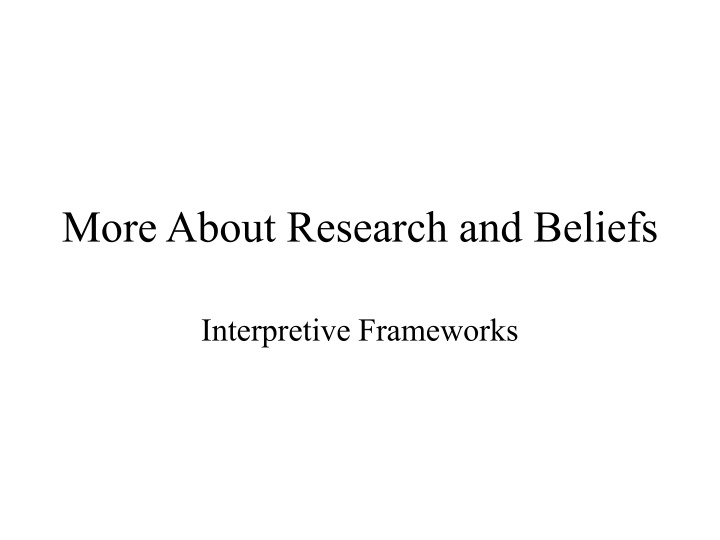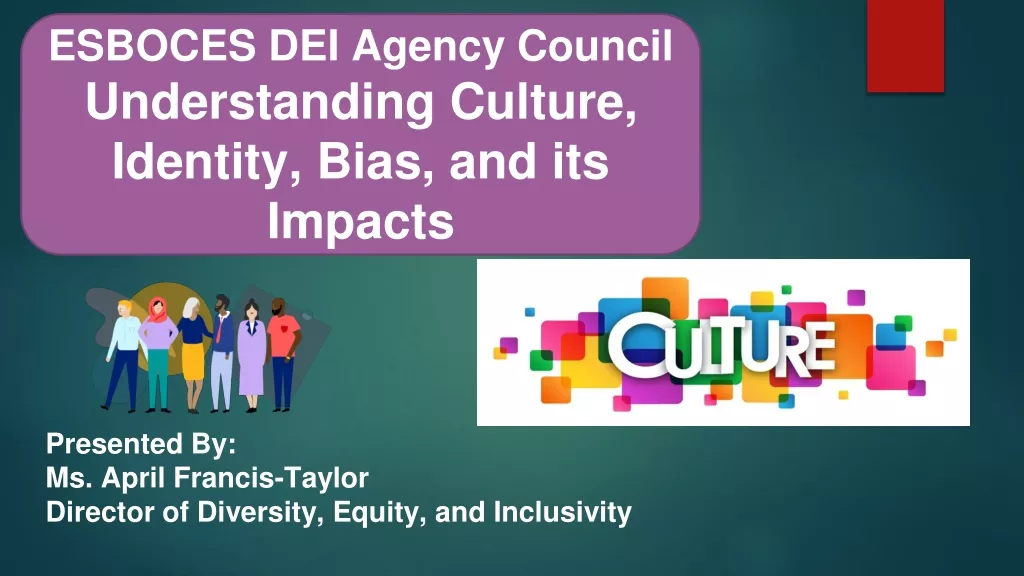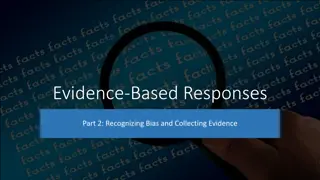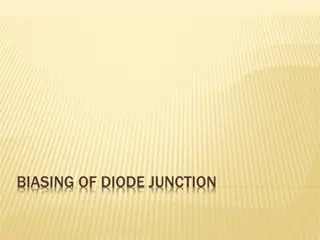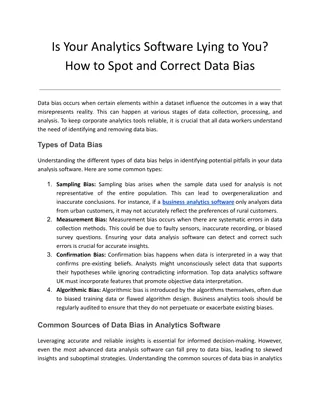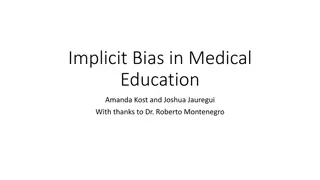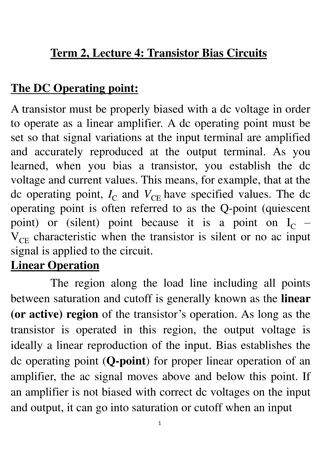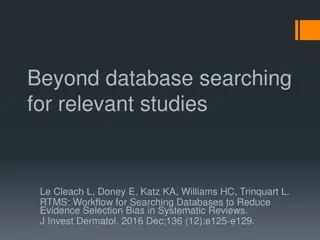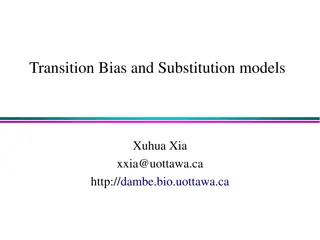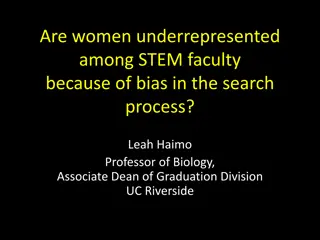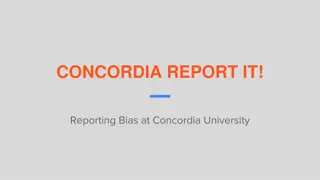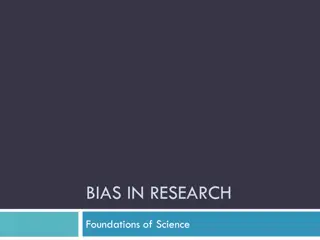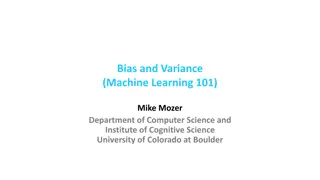Research Bias and Interpretive Frameworks
Uncover the impact of research bias on results, explore subjectivity and positionality in judgments, and understand reflexivity in research practices. Learn about validity considerations for accurate and generalizable research outcomes.
Download Presentation

Please find below an Image/Link to download the presentation.
The content on the website is provided AS IS for your information and personal use only. It may not be sold, licensed, or shared on other websites without obtaining consent from the author.If you encounter any issues during the download, it is possible that the publisher has removed the file from their server.
You are allowed to download the files provided on this website for personal or commercial use, subject to the condition that they are used lawfully. All files are the property of their respective owners.
The content on the website is provided AS IS for your information and personal use only. It may not be sold, licensed, or shared on other websites without obtaining consent from the author.
E N D
Presentation Transcript
More About Research and Beliefs Interpretive Frameworks
Research In research we are always making decisions about what we see. That means, because of those decisions, there are things we will not see. That means that research results will ALWAYS be biased by the choices you make. Part of a researcher s job is to make that bias as obvious as possible.
Subjectivity The perceptions, experiences, expectations, personal or cultural understanding, and beliefs specific to a person that influence and inform an individual s judgments about truth or reality.
Positionality I see what I am disposed to see. When I see something it means that I do not see other things. (figure/ground)
The Influence of Positionality Research design Data gathering Analysis
Reflexivity Since study design, data collection, and analysis are to some extent a product of the researcher s positionality, it is crucial to research that a researcher makes the influences on subjectivity as apparent as possible.
Reflexivity In quantitative research we do this by eliminating as many influences of the researcher as possible. Attention to validity and reliability usually presented in the methods section In qualitative research we do this by including rigorous self-reflection on the research process in the final report. It can be anywhere in the report
Validity When is research valid?
Validity Research is valid when it is an accurate and generalizable description of the phenomenon being investigated. Generalizable beyond the study sample Accurate The study design and execution does not impact the results Instrument validity
Validity Research is valid when it is an accurate and generalizable description of the phenomena being investigated. Over the history of research we have adopted rules to establish validity of research. Follow the rules and you will have valid research.
Research Assumptions An observable world exits outside of me. I can use my five senses to gather information about that world. I can apply a logic (rules) to understanding that information.
Empiricism Locke, J. (1689). An essay concerning human understanding. Retrieved from https://ebooks.adelaide.edu.au/l/locke/john/l81u/ Tabula rasa Understanding the world through the senses Applying scientific method
Rules of Research Scientific Method Formulate a question Hypothesis Prediction Testing Analysis
Positivism Comte, A. (1856). A general view of positivism. Retrieved from https://archive.org/details/ageneralviewpos00comtgoog Positivism (after Locke) Sociology (empiricism for the social)
Tenets of Positivism What is true is that a world exists outside of oneself that can be observed. What is knowledge is information gathered through the senses. The logic of positivism is analytical reasoning. What is valuable is improvement of society.
Philosophy Terminology What is true is metaphysics What is knowledge is epistemology Logic is the rules of dealing with information Values are axiology
Philosophy of Positivism Metaphysics: a world exists outside of oneself that can be observed Epistemology: knowledge is information gathered through the senses Logic: analytical reasoning Axiology: improvement of society is valuable
What is knowledge based on What is real How can thoughts be organized What is moral
Realism An external material world Aristotle, Locke, Hume Sense experience Both deductive and inductive Natural law
Idealism Unchanging universal mind Realizing latent ideas Plato, Berkeley, Many Religions Deductive from universals Absolute and eternal
Pragmatism Interaction of an individual with the world Pierce, Dewey, James Constant examination of change Relative and situational Inductive
Existentialism Human being as creator of his or her own existence Kierkegaard, Nietzsche, Sartre Total freedom of choice and total responsibility for choices
Philosophical Research Validity Idealist: latent truths are revealed Realist: accuracy in interpretation of the external world Pragmatist: results are socially valuable Existential: results help individuals make personal decisions
The Critique of Positivism You can never know universal truth but you can reject false belief Popper K. (1959). The logic of scientific discovery. Eastford, CT: Martino Fine Books. Knowledge changes in paradigm shifts: knowing by consensus Kuhn, T. (1962). The structure of scientific revolutions. Chicago IL: Chicago University Press.
Post-Positivism Interpretivism: Knowledge is gained through interpretation The researcher cannot be separated from the research Research can serve many purposes Locating rationality in structures of interpersonal linguistic communication Habermas, J. (1984). The theory of communicative action. Boston, MA: Beacon Press
Five Interpretive Frameworks There are more
Pragmatism Understanding Solutions The nature of knowledge, language, concepts, meaning, belief, and science are all best viewed in terms of their practical uses and successes. What is the problem and do the results of study provide a practical course of action?
Transformation and Critical Theory Understanding the Givens Habermas 3 types of knowledge Control (Clarification of causal relationships) Positivism Communication (Establishing understanding among actors) Interpretivist Emancipation (Transforming the givens) Critical Theory
Critical Theory Habermas identifies cognitive interests in emancipation as implying a third form of knowledge. This knowledge is constructed through a methodology of self-reflection and critical analysis of social conditions impacting one s life. Its purpose is to identify those conditions which have been defined through uncritically accepted ideology as givens, and to transform those conditions into targets for critique and change. Peck, 1991
Social Constructivism Understanding Shared Culture Individuals within groups construct knowledge for one another, collaboratively creating a culture of shared artifacts with shared meanings. Culture plays a large part in cognitive development. Vygotsky
Symbolic Interactionism Understanding Human Interaction We define ourselves through what we believe about how others see us (the looking-glass self). Meaning is derived from the social interaction that one has with other humans. The need to study human interaction. These meanings are modified through reflection based on language derived from symbolic understanding. The world is defined subjectively.
Positivism Understanding What is Most Likely Scientific verification Empiricism applied to understanding society Post positivism believes that truth cannot be known but that probabilities of truth can be established
Qualitative Interpretive Frameworks Positivism Social Constructivism Understanding lived experiences Pragmatism Determining best outcomes Critical Theory Facilitating emancipation Interpretivism
Why This Is Important Positionality How you gather and analyze data is influenced by what you intend to do with the results. different purposes different processes You have to be careful that you get the right study design for the right purpose.
John Creswell University of Nebraska Creswell, J. W. (2013). Qualitative inquiry and research design: Choosing among five approaches (3rd ed.). Los Angeles, CA: Sage
Creswells 5 Methods There are many, many more and many variations of each. There is a continuum of the degree to which specific procedures should be used with each method. Creswell tends to be in the middle.
Narrative Research Interpretive framework Usually symbolic interactionism Purpose Examining experience through personal stories Data The stories from one or a few respondents Interviews but could include other forms Analysis Usually analyzed thematically (restorying)
Phenomenological Research Interpretive framework Usually social constructivist Purpose Establishing the sharedessence of a phenomenon through lived experience Data Exploration with a small group Interviews Analysis Usually analyzed thematically (coding) Bracketing (removing influences of prior experience)
Grounded Theory Research Interpretive framework Usually social constructivist Purpose Generation of a unified theoretical explanation Data Exploration of processes over time All possible sources Analysis Coding categories Constant comparative
Ethnographic Research Interpretive framework Usually social constructivist Purpose Generation of shared patterns within a group (culture) Data Examines social organization through fieldwork All possible sources Gathering of direct quotations Analysis Usually analyzed thematically (coding)
Case Study Research Interpretive framework Usually social constructivist Purpose Generation of assertions about a case Data Examines an individual or a small group usually All possible sources Analysis A case description
How about pragmatism and critical theory? Narrative Phenomenological Grounded theory Ethnographic Case study
A few other thoughts Hermeneutics (analysis of texts) Hermeneutical circles Descriptive statistics Summaries of characteristics of individuals in groups Historical
Creswells General Thoughts About Qualitative Research Time Complex data analysis Lots of writing Methods are not necessarily established for each kind of research
Creswells Process Think about assumptions Start reading the literature Gather data from a variety of sources Analyze Validate Report in an engaging style
